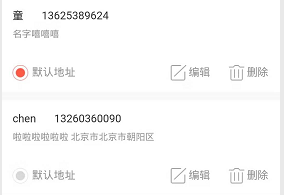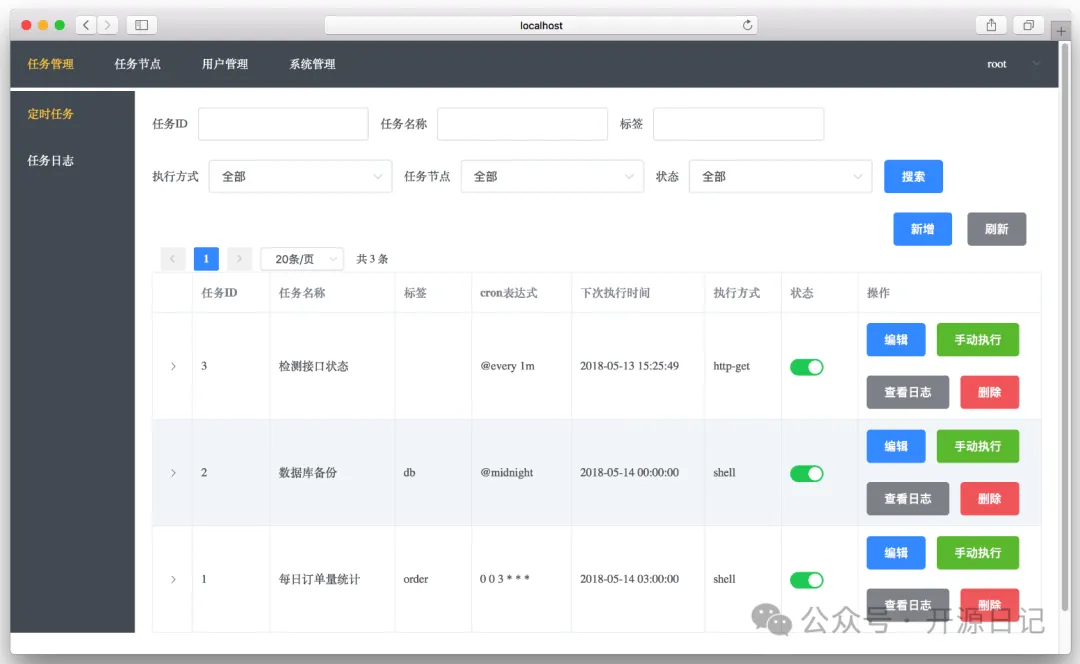本文实例为大家分享了关于Player播放器组件的具体内容,供大家参考,具体内容如下

迷你播放器:

1.播放器组件会在各个页面的情况下会打开。 首先在vuex state.js 中定义全局的播放器状态
import {playMode} from \'common/js/config.js\';
const state = {
singer:{},
playing:false, //是否播放
fullScreen:false, //是否全屏
playList:[], //播放列表
sequenceList:[], // 非顺序播放列表
mode:playMode.sequence, // 播放模式(顺序0,循环1,随机2)
currentIndex:-1, //当前播放索引
}
export default state
---------------------------------------------
// config.js
export const playMode = {
sequence:0,
loop:1,
random:2
}
2.进入播放器页面时获取播放列表数据,改变播放状态 在music-list列表中打开
在song-list 组件中派发事件到父组件,传入当前歌曲的信息和索引
<li @click=\"selectItem(song,index)\" v-for=\"(song,index) in songs\" class=\"item\">
------------------------------
selectItem(item,index){
this.$emit(\'select\',item,index)
},
在music-list 组件中接受派发事件。
<song-list :rank=\"rank\" :songs=\"songs\" @select=\"selectItem\"></song-list>
3. 如果commit 多个状态在actions 里设置
import {playMode} from \'common/js/config.js\'
export const selectPlay = function({commit,state},{list,index}){
commit(types.SET_SEQUENCE_LIST, list)
commit(types.SET_PLAYLIST, list)
commit(types.SET_CURRENT_INDEX, index)
commit(types.SET_FULL_SCREEN, true)
commit(types.SET_PLAYING_STATE, true)
}
4. 在music-list 组件中 用mapActions提交 改变值
import {mapActions} from \'vuex\'
methods:{
selectItem(item,index){
this.selectPlay({
list:this.songs,
index
})
},
...mapActions([
\'selectPlay\'
])
},
5.在palyer 中获取vuex 全局状态,赋值状态到相应位置(代码为完整代码,对照后面讲解慢慢理解)
<div class=\"player\" v-show=\"playList.length>0\"> // 如果有列表数据则显示
<div class=\"normal-player\" v-show=\"fullScreen\"> //如果全屏
<div class=\"background\">
<img :src=\"currentSong.image\" alt=\"\" width=\"100%\" height=\"100%\"> //模糊背景图
</div>
<div class=\"top\">
<div class=\"back\" @click=\"back\">
<i class=\"icon-back\"></i>
</div>
<h1 class=\"title\" v-html=\"currentSong.name\"></h1> //当前歌曲名称
<h2 class=\"subtitle\" v-html=\"currentSong.singer\"></h2> //当前歌手名
</div>
<div class=\"middle\">
<div class=\"middle-l\">
<div class=\"cd-wrapper\">
<div class=\"cd\" :class=\"cdCls\">
<img :src=\"currentSong.image\" alt=\"\" class=\"image\"> //封面图
</div>
</div>
</div>
</div>
<div class=\"bottom\">
<div class=\"progress-wrapper\">
<span class=\"time time-l\">{{ format(currentTime) }}</span>
<div class=\"progress-bar-wrapper\">
<progress-bar :percent=\"percent\" @percentChange=\"onProgressBarChange\"></progress-bar>
</div>
<span class=\"time time-r\">{{ format(currentSong.duration) }}</span>
</div>
<div class=\"operators\">
<div class=\"icon i-left\">
<i :class=\"iconMode\" @click=\"changeMode\"></i>
</div>
<div class=\"icon i-left\" :class=\"disableCls\">
<i @click=\"prev\" class=\"icon-prev\"></i>
</div>
<div class=\"icon i-center\" :class=\"disableCls\">
<i :class=\"playIcon\" @click=\"togglePlaying\"></i>
</div>
<div class=\"icon i-right\" :class=\"disableCls\">
<i @click=\"next\" class=\"icon-next\"></i>
</div>
<div class=\"icon i-right\">
<i class=\"icon icon-not-favorite\"></i>
</div>
</div>
</div>
</div>
</transition>
<transition name=\"mini\">
<div class=\"mini-player\" v-show=\"!fullScreen\" @click=\"open\">
<div class=\"icon\">
<img :src=\"currentSong.image\" alt=\"\" width=\"40\" height=\"40\" :class=\"cdCls\">
</div>
<div class=\"text\">
<h2 class=\"name\" v-html=\"currentSong.name\"></h2>
<p class=\"desc\" v-html=\"currentSong.singer\"></p>
</div>
<div class=\"control\">
<i :class=\"miniIcon\" @click.stop=\"togglePlaying\"></i>
</div>
<div class=\"control\">
<i class=\"icon-playlist\"></i>
</div>
</div>
</transition>
<audio :src=\"currentSong.url\" ref=\"audio\" @canplay=\"ready\" @error=\"error\" @timeupdate=\"updateTime\" @ended=\"end\"></audio>
</div>
打开播放器的状态
import {mapGetters,mapMutations} from \'vuex\';
...mapGetters([
\'fullScreen\',
\'playList\',
\'currentSong\',
\'playing\',
\'currentIndex\',
])
注意:不可在组件中直接赋值改版vuex 中的状态 this.fullScreen = false 需要通过mutations 改变,定义mutation-types 和mutations 然后 用vuex的 mapMutations 代理方法调用
[types.SET_FULL_SCREEN](state, flag) {
state.fullScreen = flag
},
import {mapGetters,mapMutations} from \'vuex\';
methods:{
...mapMutations({
setFullScreen:\"SET_FULL_SCREEN\",
}),
back(){
this.setFullScreen(false)
},
}
设置点击播放按钮方法
<i :class=\"playIcon\" @click=\"togglePlaying\"></i>
togglePlaying(){
this.setPlayingState(!this.playing); //改变全局变量playing 的属性
},
// 然后watch 监听playing 操作实际的audio 标签的播放暂停
watch:{
playing(newPlaying){
let audio = this.$refs.audio;
this.$nextTick(() => {
newPlaying ? audio.play():audio.pause();
})
}
},
// 用计算属性改变相应的播放暂停图标
playIcon(){
return this.playing? \'icon-pause\':\'icon-play\'
},
设置点击播放上一首和下一首按钮方法。用mapGetters 获取currentIndex 的值(加一或减一) 并改变,从而改变 currentSong 的状态,监听切换播放。判断播放列表界限重置。
prev(){
if(!this.songReady){
return;
}
let index = this.currentIndex - 1;
if(index === -1){ //判断播放列表界限重置
index = this.playList.length-1;
}
this.setCurrentIndex(index);
if(!this.playing){ //判断是否播放改变播放暂停的icon
this.togglePlaying();
}
this.songReady = false;
},
next(){
if(!this.songReady){
return;
}
let index = this.currentIndex + 1;
if(index === this.playList.length){ //判断播放列表界限重置
index = 0;
}
this.setCurrentIndex(index);
if(!this.playing){
this.togglePlaying();
}
this.songReady = false;
},
监听audio 元素标签的canpaly 事件,当歌曲加载就绪 和 error 事件,当歌曲发生错误的时候,做用户体验,防止用户快速切换导致报错。
设置songReady 标志位 如果歌曲没有准备就绪,点击下一首的时候直接return false
data(){
return {
songReady:false,
}
},
ready(){
this.songReady = true;
},
error(){
this.songReady = true;
},
进度条
audio元素监听 timeupdate 事件获取当前播放时间的 可读写属性 时间戳。用formt做格式化时间处理,(_pad 为补零函数 )
获取音频总时长 currentSong.duration
<div class=\"progress-wrapper\">
<span class=\"time time-l\">{{ format(currentTime) }}</span>
<div class=\"progress-bar-wrapper\">
<progress-bar :percent=\"percent\" @percentChange=\"onProgressBarChange\"></progress-bar>
</div>
<span class=\"time time-r\">{{ format(currentSong.duration) }}</span>
</div>
<audio :src=\"currentSong.url\" ref=\"audio\" @canplay=\"ready\" @error=\"error\" @timeupdate=\"updateTime\" @ended=\"end\"></audio>
updateTime(e){
this.currentTime = e.target.currentTime; // 获取当前播放时间段
},
format(interval){
interval = interval | 0;
const minute = interval/60 | 0;
const second = this._pad(interval % 60);
return `${minute}:${second}`;
},
_pad(num,n=2){
let len = num.toString().length;
while(len<n){
num = \'0\' + num;
len ++;
}
return num;
},
建立progress-bar 组件 接收pencent 进度参数,设置进度条宽度和小球的位置。player组件 设置计算属性percent
percent(){
return this.currentTime / this.currentSong.duration // 当前时长除以总时长
},
progress-bar 组件
<div class=\"progress-bar\" ref=\"progressBar\" @click=\"progressClick\"> <div class=\"bar-inner\"> <div class=\"progress\" ref=\"progress\"></div> <div class=\"progress-btn-wrapper\" ref=\"progressBtn\" @touchstart.prevent=\"progressTouchStart\" @touchmove.prevent=\"progressTouchMove\" @touchend=\"progressTouchEnd\" > <div class=\"progress-btn\"></div> </div> </div> </div>
const progressBtnWidth = 16 //小球宽度
props:{
percent:{
type:Number,
default:0
}
},
watch:{
percent(newPercent){
if(newPercent>=0 && !this.touch.initated){
const barWidth = this.$refs.progressBar.clientWidth - progressBtnWidth;
const offsetWidth = newPercent * barWidth;
this.$refs.progress.style.width = `${offsetWidth}px`;
this.$refs.progressBtn.style.transform=`translate3d(${offsetWidth}px,0,0)`
}
}
}
设置拖动
在进度条小按钮progressBtn 上添加touchstart,touchmove,touchend 事件监听方法,事件添加 prevent 防止拖动默认浏览器行为,获取拖动的信息进行计算
在实例上创建一个touch 对象维护不同的回调之间的通讯共享状态信息。 touchstart事件方法中 ,首先设置this.touch.initated为true,表示拖动开始。 记录开始点击位置 e.touches[0].pageX 存到 touch 对象上,记录当前的进度宽度。
在touchmove 中首先判断 是否先进入了 touchstart 方法,计算得到 移动的位置 减去 点击开始的位置的 偏移量长度。 let deltax = e.touches[0].pageX – this.touch.startX
就可以 设置进度条 已有的长度加上偏移量长度。最大不能超过父级progressbar 的宽度
调用this._offset(offsetWidth) 方法设置进度条宽度
在touchend 事件方法中将 this.touch.initated 设置为false,表示拖动结束,并派发事件到player 组件将audio的currentTime 值设置为正确值,参数为pencent
在progressbar 中增加点击事件,调用this._offset(e.offsetX),并且派发事件
created(){
this.touch = {};
},
methods:{
progressTouchStart(e){
this.touch.initiated = true;
this.touch.startX = e.touches[0].pageX;
this.touch.left = this.$refs.progress.clientWidth;
},
progressTouchMove(e){
if(!this.touch.initiated){
return;
}
let deltaX = e.touches[0].pageX - this.touch.startX;
let offsetWidth = Math.min(this.$refs.progressBar.clientWidth - progressBtnWidth,Math.max(0,this.touch.left + deltaX));
this._offset(offsetWidth);
},
progressTouchEnd(e){
this.touch.initiated = false;
this._triggerPercent();
},
progressClick(e){
const rect = this.$refs.progressBar.getBoundingClientRect();
const offsetWidth = e.pageX - rect.left;
this._offset(offsetWidth);
// this._offset(e.offsetX);
this._triggerPercent();
},
_offset(offsetWidth){
this.$refs.progress.style.width = `${offsetWidth}px`;
this.$refs.progressBtn.style[transform] = `translate3d(${offsetWidth}px,0,0)`;
},
_triggerPercent(){
const barWidth = this.$refs.progressBar.clientWidth - progressBtnWidth;
const percent = this.$refs.progress.clientWidth / barWidth;
this.$emit(\"percentChange\",percent)
}
},
本文已被整理到了《Vue.js前端组件学习教程》,欢迎大家学习阅读。
关于vue.js组件的教程,请大家点击专题vue.js组件学习教程进行学习。
更多vue学习教程请阅读专题《vue实战教程》
以上就是本文的全部内容,希望对大家的学习有所帮助,也希望大家多多支持。










暂无评论内容